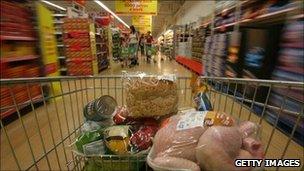UK shop price inflation 'at two-and-a-half year high'
- Published

The BRC said many grocery items were being bought on promotion
Shop prices rose at their highest rate for two and a half years in June, pushed up by soaring food prices, the British Retail Consortium (BRC) says.
Prices in shops were 2.9% higher in June compared with a year earlier, the biggest increase since October 2008. In May, the annual increase had been 2.3%.
Food prices were up 5.7% from a year ago, compared with May's rate of 4.9%.
The BRC added that higher petrol and commodity prices were also driving up overall inflation.
The BRC's director general Stephen Robertson said the food price increases were, in part, driven by a mixture of factors outside the UK.
"A weak pound has certainly got a role to play here," he told the BBC.
"But on top of that we've seen... droughts, floods and then of course in Russia we've seen some protectionist measures saying we don't want to sell our grain to the rest of the world.
"Put all that together and you're seeing some really quite sharp [price] increases."
Inflation doubts
However, Mark Price, chief executive of grocery chain Waitrose, said he didn't "recognise the inflation data that we are reading about".
He said that Waitrose had seen food price inflation running at 3%, and special offers running in supermarkets brought the rate down even further.
Coupled with "trading down, the real food price inflation is 2.1%", Mr Price said.
Price pressures
The BRC predicted that prices could rise further, due to higher grain prices, and also as a result of wage rises in commodity-exporting countries.
The group added that shop prices were going up much more slowly than the wider Consumer Prices Index, which currently shows inflation at 4.5%.
Consumers were also using promotions and discounts to try to minimise the impact of inflation on their bills, the BRC said, pointing to recent data from research firm Nielsen which showed 39% of all grocery spending was on promoted goods.
- Published18 September 2012

